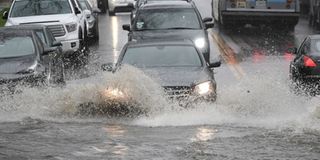Staying safe on the road this rainy season

On a flooded road, drive in first gear as slowly as possible but keep the engine speed high and steady by slipping the clutch. PHOTO / internet
What you need to know:
We have recently experienced heavy rains and as you very well know, wet, rain-drenched roads mean decreased visibility and increased risk of accidents. Let these tips guide you to be ever vigilant and stay safe on the road.
When it rains, traffic increases and everything seems slower. However, the need to get to our destinations does not diminish with the weather conditions. This means that some people will try to drive more aggressively, causing accidents.
Motorists ought to understand that when it rains, vehicle manoeuvrability and traction reduces greatly since friction reduces. This makes it easier for the car to skid. As the rains intensify, here are some things motorists should remember as they drive:
As you head out
Derrick Kisakye, a mechanic at Good Tyre Garage in Kampala, says a car owner must ensure that their vehicle is well maintained and properly serviced.
“While this is good driving practice, it is critical during wet weather since the conditions make any malfunction worse. For instance, owing to reduced friction, malfunctioning brakes will lead to an accident quicker on a wet road than on a dry road,” he says.
Also, ensure that your car’s wipers are functional in order to maintain a clear view.
“With non-functional wipers, your visibility is compromised. In that state, chances are you will miss a big ditch, causing damage to your car. You could also bump into the car ahead of you, hence ruining your day with the technicalities involved,” Kisakye says.
Ensure that your car tyres are in proper condition. For instance, the treads must be good enough to create a firm grip on the slippery road. With friction reducing as the rains fall, Kisakye says, well-treaded tyres are your best ally. To ensure that the drive is even smoother, the brakes also ought to be in top notch condition because they will do a lot of work during this weather,” he says.
It is also crucial that your battery is in great condition because with the increased traffic, there will be several stops and sometimes, prolonged ones.
“Oftentimes, when a car has a faulty battery, such as one that does not start the engine with ease, you will dread turning off the engine. However, with the traffic jam that is common on most rainy days, turning off the engine is inevitable,” Kisakye says.
While on the road
It is also important that you also put other road users into consideration.
Drive carefully: Haphazard driving will put you and other road users at risk. ‘‘Therefore, maintaining steady driving is crucial for the safety of all,” David Kwikiriza, a mechanic, says. Additionally, keep in your lane to avoid creating confusion on the road.
Slow down: Apart from being steady on the road, it is imperative that you slow down.
“There is no reason to rave or fly during the rainy season because there is no certainty that your brakes will work exceptionally when needed. It is, therefore, advisable that you keep your speeds within acceptable levels,” Kwikiriza says.
Watch out for road hazards: During rainy weather, chances of trees falling or the road getting washed away are high. Therefore, Kwikiriza advises motorists to be on the lookout for these.
“That is why it is imperative to drive carefully and keep within the speed limit so that you are able to see any disasters that lie ahead of you. Additionally, as you keep within the set limits, it is easy to make quick and wise decisions in case you meet these hazards,” he says.
Keep your distance: Good driving practices demand that motorists keep a fair distance from others. Kwikiriza says this is to ensure that there is enough room for one to react in case there is need to brake or swerve.
“On a rainy day, keeping distance is even more crucial because the friction between the tyres and the road has greatly reduced. That is even greater at the start of the rain when the water washes the oils in the road to the surface. To avoid accidents, it is imperative that motorists keep distance between them and the car ahead,” he says.
Turn on the lights: During a heavy downpour, visibility is reduced for all road users. Therefore, Kwikiriza advises motorists to turn on their lights to help all road users see well.
“Lights will not only help help drivers see the car ahead of them but will also help other drivers easily see them,” he says. Drivers should also switch on their headlights, low beams as well as rear fog lights. However, they should neither use hazard lights since there is no emergency nor high beam lights which are too bright, hence blinding.
In case of flooding: There are times when for one reason or another, our roads flood. When this happens, Kwikiriza advises: “In a flooded place, drive steadily, keep the engine speed up and consistent and avoid braking. However, if the water levels are high, there is no reason as to why you should risk getting submerged in the water. Additionally, if there is an alternative route, it is advisable to use it to avoid any debris that the water may have carried.”
Carry an emergency kit
What would you do if you are stuck on the road in the dead of the night? Make sure you have the following things with you:
• Flashlight (preferably waterproof).
• Umbrella or raincoat (or both).
• Extra clothes.
• Mosquito repellent.
• Tough shoes.
• Power bank.





